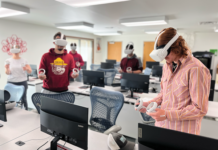By BF Editors
From the March/April 2023 Issue
For the 10th consecutive month, Texas set new job levels for 2022 by adding 16,400 total nonagricultural jobs last August, and total nonagricultural employment reached 13,530,100, according to data released by the Texas Workforce Commission (TWC).
“Thanks to the strength of the Texas economy and the best workforce in America, Texas has surpassed three major employment milestones, smashing all previous records with more jobs than ever, more Texans working than ever, and the largest labor force ever in the state’s history,” Governor Greg Abbott said.

“While the nation faces economic headwinds, Texas leads all states for nonfarm jobs added over the last 12 months—a testament to continuing business confidence in the Lone Star State’s pro-growth economic policies and the unrivaled quality of our young, skilled, diverse, and growing workforce. Working together, we will keep Texas the best place to live, work, start a business, and raise a family.”
Texas added a total of 726,900 positions since August 2021. The seasonally adjusted Texas unemployment rate was 4.1%, an increase of 0.1 percentage points from July 2022.
“Private industry jobs are up more than six percent from this time last year, and Texas employers continue to expand their workforces,” Texas Workforce Commission Chairman Bryan Daniel said.
Professional and Business Services led private industry job growth in August 2022 with 5,200 positions added, followed by Education and Health Services, which grew by 3,800 jobs. There were 2,800 jobs added in the Financial Activities sector.
This new record for jobs and total employment was one signal that business leaders have continuing confidence in the Texas business climate, noted Robert Allen, then President and CEO of the Texas Economic Development Corporation (TxEDC). “We’re thrilled that Texas set this new employment record, supporting Texas employers and providing good jobs for all Texans,” Allen said at the time. “Texas’s continuing success is the product of an ongoing collaboration at all levels to develop and educate a skilled workforce pipeline ready to take these news jobs and those in the future.” (As of April 3, Allen is President of the newly formed Fort Worth Economic Development Partnership.)
Also reported at that time, the Amarillo and Austin-Round Rock Metropolitan Statistical Areas (MSA) recorded August’s lowest unemployment rates among Texas MSAs with a not seasonally adjusted rate of 3.0% each. This was followed by Midland at 3.3%, then Abilene, College Station-Bryan, Lubbock, and San Angelo each at 3.3%.

The Lone Star State is home to more than 14.5 million people, who are among the youngest in the nation. Texas also continues to be the fastest growing state in the country, adding nearly 4.8 million to its population since 2010.
The state is home to 37 public four-year universities, seven state university systems, and 50 community college districts. There are also six of the nation’s top 100 universities there, according to U.S. News & World Report, and 11 Tier One research universities, which help develop the talent pipeline.
The Lone Star State invests in its workforce through programs such as the Skills Development Fund, the Texas Talent Connection Grant, and the Governor’s University Research Initiative (GURI). The GURI program helps recruit nationally recognized researchers from around the world to the state of Texas, to help bolster its higher education institutions.
Texas-Sized FDI Outreach
Foreign direct investment continues to be a focus for the state with the ninth-largest economy in the world (by GDP). In September 2022, TxEDC and Gov. Abbott’s Office of Texas Economic Development & Tourism concluded an international business recruitment mission that included high-level meetings with government officials and business executives, along with events in London, Paris, and Frankfurt.
The Texas delegation included the First Lady of the State of Texas Cecilia Abbott, Texas Secretary of State John Scott, President & CEO of the TxEDC’s Allen, and the Executive Director of the Governor’s Texas Economic Development & Tourism Office Adriana Cruz. The group was joined by a dozen other economic development leaders from across the state.
The delegation met with executives who are considering Texas as a location to establish or expand their footprint. In London and Paris, the delegation met with trade leaders at the respective U.S. Embassies, which also included a meeting with the U.S. Ambassador to France, Denise Campbell Bauer.
Texas has strong business and economic connections with the U.K., France, and Germany, with a reported total of 580 projects in the state over the last decade, all of which is expected to create $21.2 billion in capital investments and more than 34,000 jobs.
At the final stop of this trade mission, the delegation visited and toured the Volkswagen headquarters in Wolfsburg, Germany.
“I was honored to join this highly successful business development mission to Europe and help share the Texas story with business decision-makers in three of our top international trade and investment markets,” said Cruz of the trip. “Under Governor Abbott’s leadership, Texas ranks as the most popular destination in the United States for foreign direct investment and has been the top exporting state in the nation for the last 20 years. Our office is committed to upholding Texas’ competitive business advantages for international businesses to continue to thrive.”
Tech Growth: AI Degree Launched, Esports Taking Off
Tech advancements are right at home in Texas, and a new degree in artificial intelligence as well as growth in esports and professional gaming are just two examples of emerging industries in the state.
The University of Texas recently announced a new degree program that it says will be a “game-changer” for students who are looking to push the boundaries of technology. The University of Texas at Austin will offer a Master of Science degree in artificial intelligence (AI) that, according to university officials, will be the first of its kind from a major computing institution.
One differentiator according to the university: The two-year online program will be able to enroll far more students than the dozens at current AI masters programs. Texas officials suggested it could match the enrollments of its online programs in computer science and data science; each of those programs reached 2,500 students in less than five years. For another, the university states the program cost is substantially lower than other available AI programs. The price tag and online structure, Texas officials said, would make the program both accessible and flexible enough to attract talent into the rapidly growing AI field. Students may apply to the degree beginning the spring semester of 2024— pending the program’s final approval by the Texas Higher Education Coordinating Board.
Meanwhile, San Antonio is a growing job market for professional gamers and skills related to Esports (electronic sports). According to recent data from Fortune Business Insights, the global eSports market is projected to grow from $1.44 billion in 2022 to $5.48 billion by 2029, at a CAGR of 21.0% in forecast period, 2022-2029.
Esports are the top attraction at the Boeing Center at Tech Port entertainment venue in San Antonio. According to Statista, Esports reached 532 million people worldwide in 2022. The League of Legends World Championship in 2018 brought in over 100 million viewers.
Over the last decade, Texas has targeted diversified development in advanced manufacturing and related sectors. The state is home to multiple segments of the industry—everything from computer and electronic goods to motor vehicle and parts manufacturing to food and beverage production.
Increasingly known as the manufacturing capital of the nation, Texas is no stranger to attracting large, high-tech manufacturing operations. An abundance of available resources and affordable real estate serves as a major draw for companies looking to relocate or expand. The state’s robust network of transportation infrastructure allows companies direct access to domestic and international markets and the ability to easily ship products.

Irving-Las Colinas Attracts Wells Fargo and CAT HQs
Headquarters operations are choosing Texas for relocations or expansion. With more than 50 Fortune 500 companies calling the state home, not to mention a vast number of other firms based here, companies are taking notice of the friendly business climate and vast location and quality of life choices in the state.
In North Texas, Irving-Las Colinas is an area that attracted two major corporate headquarters projects in 2022. Wells Fargo is consolidating 3,000 employees from around the metro to a new campus in Irving-Las Colinas. The project consists of two new 10-story, 400,000 SF Class A office towers for the financial services company. The campus represents a $455 million capital investment. Wells Fargo received $5 million incentives from the Texas Enterprise Fund and $30 million through Irving’s Tax Increment Reinvestment Zone No. 1 (TIF District). The 22-acre site is slated to open in 2025.
Also in 2022, Caterpillar Inc. moved its global headquarters to Irving, TX. The construction machinery and equipment manufacturer has had a presence in Texas since the 1960s and has established its new headquarters in an existing Irving facility. “We believe it’s in the best strategic interest of the company to make this move, which supports Caterpillar’s strategy for profitable growth as we help our customers build a better, more sustainable world,” said Caterpillar Chairman and CEO Jim Umpleby.
Beth A. Bowman IOM, CCE, President and CEO, Irving-Las Colinas Chamber of Commerce, and Irving Economic Development Partnership, commented, “We know that Wells Fargo and Caterpillar selected Irving-Las Colinas for many of the same reasons that other companies are choosing our city to call home. With its expanded presence in Irving-Las Colinas, Caterpillar now occupies five floors of Class-A office space in Williams Square in the heart of Irving’s urban center, and Wells Fargo’s two 400,000-square-foot office towers will soon be under construction just a few blocks away.”
More than 84,000 jobs have been created or supported in the Irving-Las Colinas region since 2018. Explains Bowman, “We work closely with our local public schools, including Irving, Carrollton-Farmers Branch, and Coppell Independent School Districts, which have diverse STEAM and career-technical education courses that give students a pipeline into jobs with employers in our region. We partner with multiple universities, other area chambers and organizations in North Texas on the Bridging the Talent Gap initiative, which helps better identify skills and workforce needs. Finally, we are proud to partner with Workforce Solutions Greater Dallas in their mission of workforce development and job placement for our region’s workers.”
Toward A New Chapter
As 2022 came to a close so did the well-known Chapter 313 in Texas, an economic development tool in place since 2001 through the state legislature. As the program’s December 31 date approached, lawmakers did not move to extend it.
Texas Tax Code Chapter 313 (aka the Texas Economic Development Act) created a state tax incentive program for capital-intensive projects to limit the appraised value on their property for the purposes of local public school district property taxes. In exchange for the value limitation, the business agreed to build or install new property and create jobs in the school district.
Over the years, Chapter 313 incentives have been credited with helping to bring in many projects, including the Toyota truck plant to San Antonio and Samsung’s semiconductor facility to Austin. Gov. Abbott has addressed the issue in several outlets this year, and the business community is watching for what might replace the program.
















![[VIDEO] Get More for Your Business in Ardmore. Oklahoma](https://businessfacilities.com/wp-content/uploads/2024/02/maxresdefault-324x160.jpg)
